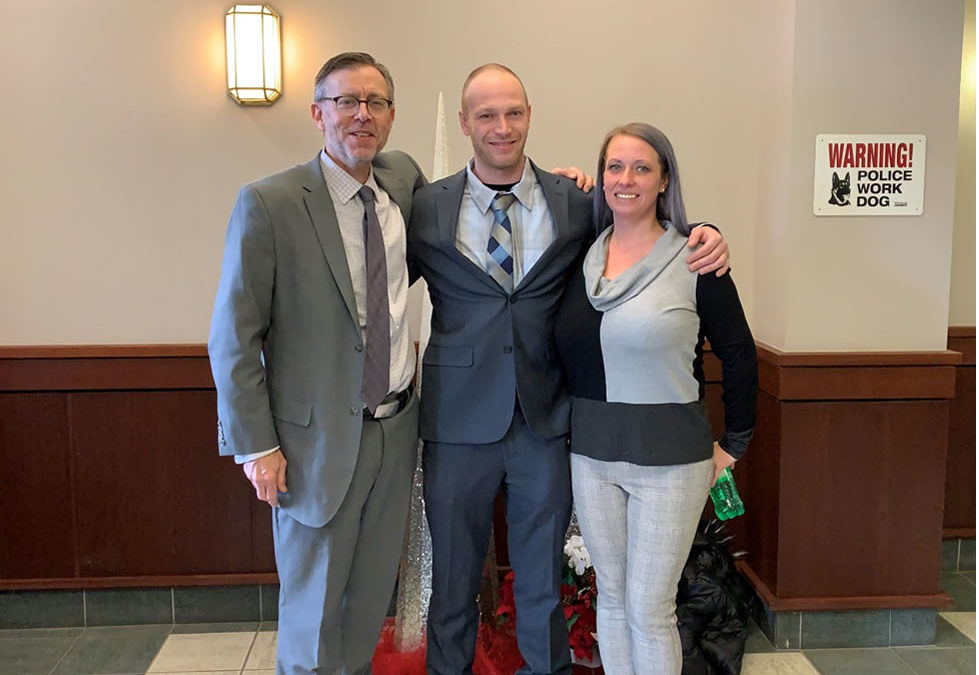
Feb 21, 2020 | Blog, Court Case Files, News
LANSING, MI — Michigan courts and police continue to work within a gray created by state marijuana legalization that contradicts federal law.
Not only are lines blurred by conflicting jurisdictional laws, and complicated by the division of the state’s medical and recreational statutes, but Michigan courts operate, in part, based on precedents established under the now-faulty premise that marijuana is illegal.
A court ruling could help to tidy things up a bit. The Court of Appeals in an opinion published Feb. 13, 2020 ruled that, while police must have more evidence than simply the scent of marijuana to justify a warrant-less vehicle search, lying or deceiving police may change that.
In November 2018, Trooper Allan Park of the Michigan State Police stopped medical marijuana caregiver Thomas Moorman at a gas station in the Upper Peninsula’s Alger County for speeding.
Park claimed he smelled “a strong odor of fresh marijuana emanating from the vehicle, which indicated to him that there was a ‘good quantity’ of marijuana in the vehicle,” the Court of Appeals said in their ruling.
Moorman said he had no marijuana but as questioning persisted, he admitted that he harvested some marijuana earlier in the day. He also told the trooper he was a registered medical marijuana caregiver with five assigned patients, the Court of Appeals said.
The court ruled. ” … We conclude that defendant’s behavior (denying the presence of marijuana) was inconsistent with being in lawful possession of marijuana … This behavior, in conjunction with the odor of marijuana, gave rise to probable cause …
The court did not address how possession of recreational marijuana might impact an officer’s right to conduct a vehicle search.
Read More @Mlive.
Case Law Reference
People v Williams, 472 Mich 308, 315; 696 NW2d 636 (2005).
“[U]nder the automobile exception, the police may search a motor vehicle without the necessity of first obtaining a warrant if probable cause to support the search exists.”
Kazmierczak, 461 Mich at 418-419.
In Kazmierczak, this Court held that “the smell of marijuana alone by a person qualified to know the odor may establish probable cause to search a motor vehicle, pursuant to the motor vehicle exception to the warrant requirement.” Kazmierczak, 461 Mich at 413.

Dec 22, 2019 | Blog, Court Case Files, Komorn Law Blog, Recent Victories
Overcharged
As it goes, my clients were overcharged with crimes involving drugs, guns, bombs and money. We litigated this case for over three years including 5 days of preliminary exam testimony, and several motions litigated at the District Court and the Circuit Court.
We had made several appearances in circuit court in our continued effort to challenge the governments search and seizure of evidence because of the illegal “Knock and Talk”
Knock and Talk
When the police don’t have enough evidence to get a search warrant, they sometimes employ a procedure they have nicknamed “knock and talk” to investigate further.
Courts have ruled that a police officer has the same right as an everyday citizen (for example, a Girl Scout selling cookies) to visit your house, knock on your front door, and ask to speak with you.
Unfortunately, abuses of the “knock and talk” technique are now rampant.
Two Cases
Two somewhat recent cases in Michigan have helped clarify the law in this area.
In one case, from 2015, when no one answered the front door, the police started walking around the property knocking on back doors and side doors until they spotted some marijuana through a window in the back of the house.
The instinctual fourth amendment argument is that the police need a warrant before they roam around your back-yard peering into your windows.
In July 2016, however, the Supreme Court dismissed the appeal without deciding the issue.
People v. Radandt
That same month a similar case before the Michigan Supreme Court, was heard, arguing that a so-called “knock and talk” violates the Fourth Amendment when it is conducted in the middle of the night.
People v. Frederick; People v. Van Doome
In June 2017 the Michigan Supreme Court agreed with this argument and held that the police were trespassing, and therefore violating the Fourth Amendment, when they woke up suspects and their families in the middle of the night to interrogate them in their homes. People v. Frederick; People v. Van Doorne;
In People v Frederick, 500 Mich 228, 895 NW2d 541 (2017), the supreme court considered the scope of the implied license a homeowner extends to the general public in People v Frederick, 500 Mich 228, 895 NW2d 541 (2017).
The police had visited defendants’ homes during the early morning hours (4:00 and 5:30 a.m.) and knocked on the door. After conversations during which both defendants consented to searches of their homes, the police searched the homes and recovered marijuana products.
The court concluded that the procedure was not a permissible “knock and talk,” which is permitted because the public, and the police, have an implied license to approach the door, knock and wait briefly to be received, and then, if not invited to stay longer, leave.
The court reasoned that the scope of the implied license is time sensitive and that generally there is no implied license to knock at someone’s door in the middle of the night.
In exceeding the scope of the implied license, the police were trespassing. The trespass, coupled with information gathering (the police were seeking to find something or gain information), constituted a search under the Fourth Amendment, and because the police did not have warrants and no exception to the warrant requirement existed, the approaches violated the Fourth Amendment.
The court further held that defendants’ consent, even if voluntary, was invalid unless it was sufficiently attenuated from the warrantless search. A court considers the following factors in making that determination: (1) the temporal proximity of the illegal act and the alleged consent, (2) the presence of intervening circumstances, and (3) the purpose and flagrancy of the official misconduct. The court remanded the case for a weighing of those factors by the trial court.
Back to the Case at Hand
The facts of this case were very similar to the Fredericks case.
Here several officers ( some in uniform, some in raid gear and none of them in girl scout uniforms), in several different vehicles, (some marked some unmarked), encroached and trespassed upon my clients property, came into the back yard and insisted that FANG had the authority to do a compliance check of their medical marihuana grow.
We took issue with the coming into the back yard, because it was a trespass. We also took issue with the concept that a multi-jurisdictional task force has the authority to do a compliance check for MMMA behavior, or would be able to determine compliance if they did have the authority and by asserting the authority ( that they did not have), directly impacted the volition of the alleged consent to search.
MCL 333.26426 (g) Possession of, or application for, a registry identification card shall not constitute probable cause or reasonable suspicion, nor shall it be used to support the search of the person or property of the person possessing or applying for the registry identification card, or otherwise subject the person or property of the person to inspection by any local, county or state governmental agency.
The evidentiary hearings had been very contentious, and it may be fair to say that the investigators and officers in this matter did not like my suggestions that they had trampled all over my clients 4th amendment rights.
Status Quo: Overcharged
The original overcharging of by the prosecutor’s office is a common practice.
Anytime allegations involve the combination of narcotics and firearms (even if licensed, registered, CCW or CPL) Prosecutors love to charge felony firearm. Felony firearm mandates a 2 years term of imprisonment in the Michigan Department of Corrections to run consecutive to any other sentence.
The jury instruction is complicated, and sometimes a compromised jury will think it is doing a favor for the accused and find him or her not guilty of the underlying felony and guilty of the felony firearm only. This is illogical in any legal analysis but does not matter and will still result in a mandatory 2 years in prison.
Bomb Making Charge – Because It Exploded
One of the more outrageous and memorable examples of prosecutors overcharging, and incidentally was one of the counts dismissed at the exam, was for the crime of bomb making.
This count was literally created by the police after seizing legal fireworks, ( what are commonly known as M80’s- flash powder) then testing the fireworks (they blew off some fireworks) and then created a report that concluded that the fireworks were bombs because they created an explosion.
As I said this count was dismissed at the exam, but this bomb making count is just another example of the awesome power that the prosecutors have. They are literally the “Kings of the Court Room.”
Kings of the Courtroom
The Kings of the Courtroom (and Queens) run their kingdom like a well-oiled machine. They have the awesome power to charge any crime they want.
It is only the Prosecutors who can add to the charges, amend the charges, increase or decrease the charges or dismiss the charges. And of course, they have absolute immunity from civil liability while doing it.
This is the reason that 95-97 percent of people charged with crimes plead guilty.
“A study by Northwestern University Law School’s Centre on Wrongful Convictions found that 46% of documented wrongful capital convictions between 1973 and 2004 could be traced to false testimony by snitches—making them the leading cause of wrongful convictions in death-penalty cases.
The Innocence Project keeps a database of Americans convicted of serious crimes but then exonerated by DNA evidence. Of the 318 it lists, 57 involved informants—and 30 of the convicted had entered a guilty plea.”
“The prosecutor has more control over life, liberty and reputation than any other person in America,” said Robert Jackson, the attorney-general, in 1940. American prosecutors are more powerful than ever before.
The Pressure to Plead Guilty
Several legal changes have empowered them. The first is the explosion of plea bargaining, where a suspect agrees to plead guilty to a lesser charge if the more serious charges against them are dropped.
Plea bargains were unobtainable in the early years of American justice. But today more than 95% of cases end in such deals and thus are never brought to trial.”
“Jed Rakoff, a district judge in New York, thinks it unlikely that 95% of defendants are guilty. Of the 2.4m Americans behind bars, he thinks it possible that “thousands, perhaps tens of thousands” confessed despite being innocent. One reason they might do so is because harsh, mandatory-minimum sentencing rules can make such a choice rational. Rather than risk a trial and a 30-year sentence, some cop a plea and accept a much shorter one.”
Battle Weary: Back to the Case at Hand
As it goes, and only because of our hard work, my client’s will, desire and commitment to this battle, today we were finally rewarded.
Clients were beyond joyful for the results today, but even with that said, it is hard to really understand, unless you live through it, just how overwhelming the State can be when they want.
All charges were dismissed as to one of the accused, and a plea to a few benign misdemeanors, with immediate sentencing to fines for the other. Case over.
It was a long hard battle and one that we were prepared to continue. The motivation to resolve as we did today, was primarily because the allegations in this case had a lot of potential liability. which was one of the motivations to resolve the case as we did.
Case Dismissed – Case Closed…It was a good day.
See the Court Register of Actions Here
Case Register Of Actions-Smith
Case Register Of Actions-Burns

Aug 3, 2018 | Blog, Court Case Files, News
According to some cannabis attorneys patients and caregivers as well as cultivators in Michigan can’t process their plants without breaking the law as a result of a Court of Appeals decision.
During the drying process between when a marijuana plant is harvested and completely dried for use (AKA -wet marijuana), that time is not covered by the state law, according to a Michigan Court of Appeals decision ruling on July 19, 2018.
The appeals court case — People v. Vanessa Mansour — arises from a police raid at Mansour’s Troy home. There they found marijuana plants and marijuana buds in different stages of wet and drying. They also found dried marijuana buds.
Mansour was a medical marijuana patient at the time.
Mansour’s defense argued that the marijuana that was drying was not usable and therefore qualified her for immunity under state law. They argued the drying marijuana should not be considered as authorities made up their charges.
“To say that the legislature makes it legal to possess growing plants and to possess a limited amount of finished product — but that in between, everybody is just illegal — that’s the interpretation that the Court of Appeals has hoisted on everybody,” Neil Rockind said.
The Carruthers ruling is outdated and not relevant, Rockind said.
Court’s interpretation of § 4 of the MMMA in People v Carruthers, 301 Mich App 590, 609; 837 NW2d 16 (2013), was controlling, and that the holding of Carruthers required the trial court to consider the total amount of marijuana possessed by defendant, not just the total amount of usable marijuana.
Rockind said it conflicts with state law and with People vs. Manuel, which the Court of Appeals previously decided. The Michigan Supreme Court has already had to refer a medical marijuana case back to the Court of Appeals due to the Manuel ruling, Rockind said.
In Manuel, the defendant was “both a qualifying patient and a primary caregiver for five patients, so he was allowed . . . to possess up to 15 ounces, or approximately 425.24 grams, of usable marijuana under the MMMA.” Manuel, 319 Mich App at 300. The marijuana he possessed was well in excess of that amount, however. The trial court held that “the marijuana . . . was unusable because it was in ‘various stages of drying.’ ” Id. at 122. It therefore ruled “that the defendant was entitled to § 4 immunity and dismissed the charges against him.”
But the COA referred to the second prong of Carruthers analysis stating.
Importantly, however, neither the prosecution nor the defendant in Manuel cited to Carruthers. Nor, perhaps largely for that reason, did this Court in Manuel cite to Carruthers.
And, consequently, neither the parties nor this Court in Manuel ever reached the second prong of the Carruthers analysis:
In short, the question of whether a possessor of marijuana possesses an allowed quantity of usable marijuana is only the beginning of the relevant inquiry under
4. A further pertinent and necessary inquiry, for purposes of a § 4 analysis, is whether that person possesses any quantity of marijuana that does not constitute usable marijuana under the term-of-art definition of the MMMA. If so, and without regard to the quantity of usable marijuana possessed, the person then does not possess “an amount of marihuana that does not exceed . . . 2.5 ounces of usable marihuana . . . .” MCL 333.26424 (a) and (b)(1) (emphasis added).
Instead, he or she then possesses an amount of marijuana that is in excess of the permitted amount of usable marijuana. In other words, the language establishing limited immunity in § 4 of the MMMA expressly conditions that immunity on the person possessing no amount of marijuana that does not qualify as usable marijuana under the applicable definitions. Carruthers, 301 Mich App at 610.
Rockind said he plans to take the case to the Michigan Supreme Court.
Michigan voters will soon be asked to consider a ballot proposal Nov. 8, 2018 that would make recreational marijuana legal in the state.
Komorn Law has represented numerous clients through the legal chaos of starting up a business in the Michigan Medical Marihuana Industry.
Contact Us For More Information.
800-656-3557




















